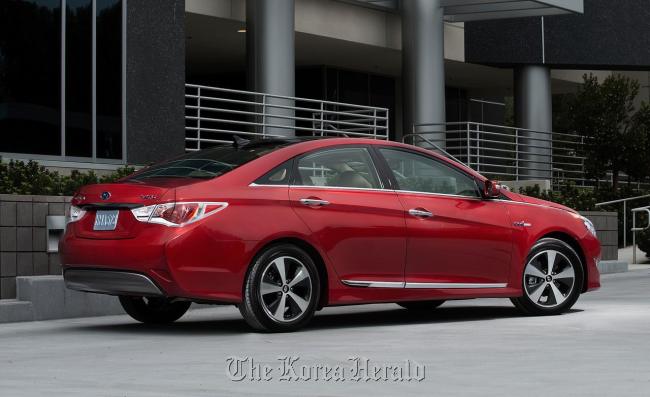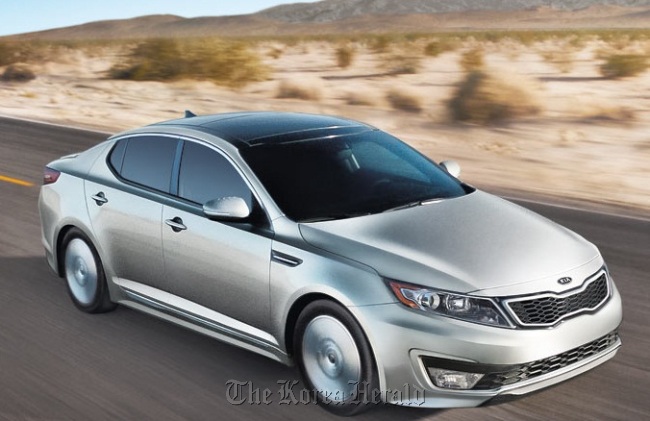Hyundai Motor Group is mapping out strategies to export hybrid cars to Europe or roll out the fuel-efficient models at its manufacturing factories in the Czech Republic and Slovakia.
Its project to advance to the European market reflects group chairman Chung Mong-koo’s instruction to drastically improve the annual production capacity for hybrid vehicles and diversify export destinations.
Hyundai Motor and Kia Motors’ hybrid models, which use two or more distinct power sources, are currently being sold only in Korea and North America.
As Toyota Motor recently set a milestone with its global sales of its hybrid cars surpassing 1 million units so far this year, Hyundai Motor Group is considering speeding up its overseas project via huge investments in the hybrid car sector.

The Sonata Hybrid of Hyundai Motor

The K5 (Optima) Hybrid of Kia Motors
Hyundai and Kia have set the hybrid car sales target at home and abroad at 350,000 units per year by 2015. Their combined sales of the models are projected to stay below 100,000 this year.
“To increase global sales and production capacity (by more than 250 percent over the next three years), it is necessary to make inroads into the European hybrid vehicle market as early as possible,” a group spokesman said.
As a step to attract interest from dealerships in Europe, the automotive group plans to release the upgraded Sonata Hybrid of Hyundai and K5 Hybrid of Kia ― with higher mileage ― in the U.S. and the local market in the coming months, he said.
The group is striving to catch up with the fuel efficiency of the Toyota Camry sedan which posts a mileage of 23.6 kilometers per liter while that of Hyundai-Kia models stays at 21 kilometers per liter.
Concerning skepticism among some consumers on relatively high price tags and uncertainties over vehicle performance, the spokesman said that more and more drivers are acknowledging a variety of benefits from owning the fuel-efficient models.
Though the models’ market share is still minimal, he cited the figure which shows a rapid growth on a year-on-year basis.
Hyundai Motor posted growth of about 70 percent in the sales of the Sonata and Avante hybrids this year. Kia Motors also reported a similar growth in its sales of the K5 Hybrid.
Group executives stress that hybrid car-oriented batteries would run more than 10 years. “The demand for the fuel-efficient cars is projected to grow steadily amid high oil prices and wide interest in environmentally friendly vehicles,” an executive said.
Automobile experts mostly share the view that the vehicle mileage is heavily affected by street conditions and driving habit.
As an example, Kia Motors’ hybrid version of the K5, dubbed the Optima in the U.S., was registered in the Guinness Book of Records by recently posting about 27.5 kilometers per liter in fuel efficiency.
The automaker carried out a challenge driving of the sedan for 12,710 kilometers for 16 days across 48 states.
“The figure exceeded the target for a world record ― 22.2 kilometers per liter ― suggested by Guinness,” Kia said in a statement.
The carmaker is posting a rapid growth in sales of hybrid sedans at home, following outstanding performances in the U.S. market.
Hyundai and Kia have faced a tough challenge from Toyota in the local market.
Toyota Motor Korea, which launched the New Camry Hybrid early this year, also saw their three new models of the New Prius series ― Prius S, Prius M and Prius E ― gain growing popularity.
The Prius models are aimed at mass production of the hybrid cars.
The models are powered by 1.8-liter engines with the high fuel efficiency of 29.2 kilometers per liter, which is backed by the Toyota Hybrid System.
The New Camry Hybrid is cheaper by 3 million won ($2,630) than its earlier model. And the new model’s fuel efficiency also exceeds the older one.
Car dealers point out that Toyota outpaces Hyundai-Kia in fuel-efficiency technologies, and the New Prius is now almost the same price as the Sonata and K5.
“Ultimately, the key factor to dominate the fuel-efficient vehicle market is the actual mileage per liter drivers feel,” a dealer in the import car industry said.
By Kim Yon-se (
kys@heraldcorp.com)







